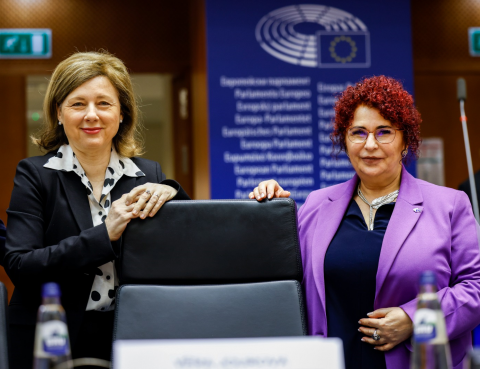European Economic
and Social Committee
EESC proposes actions to counter threats to EU democracy
On 23 March, the EESC debated with European Commission Vice-President Věra Jourová on how to strengthen democracies and democratic values across the European Union. It also adopted a resolution on this topic with practical proposals. Policymakers, experts and civil society organisations agreed that civic education, better funding for social partners and a focus on the local dimension are key to democracy in Europe.
"The European elections in 2024 will be a test of political will, and youth organisations will play a key role in mobilising first-time and young voters," said EESC President Christa Schweng, "but we must go beyond the elections. We need to better support our youth, re-connect with them in the democratic process and empower them for a fully-fledged active citizenship."
European Commission Vice-President Věra Jourová recognised the crucial role played by civil society organisations in defending and promoting democracy, often working in spaces where states have failed. "Active participation of people is not only desired but highly necessary," she said. "Democracy is under a stress test and we need to do much more to protect it and regain the trust of our people."
Participants highlighted the need for civil society organisations, including youth organisations, the social economy and voluntary sector, to have better access to funding and to be involved in defining where these resources should be used. They also agreed that transversal competences are the true backbone of a participatory and deliberative democracy.
Following the debate, the EESC adopted a resolution entitled "United for Democracy: employers', workers' and civil society's organisations working for a sustainable democratic future", which builds on the recommendations of this year's Civil Society Days. The resolution aims to strengthen democracy by increasing public participation, and reinforce the structures for participatory democracy. It also calls for the effective implementation of Article 11 of the Treaty on the European Union on citizen participation, including a European strategy for civil society and a European Statute of Associations. (tk)
